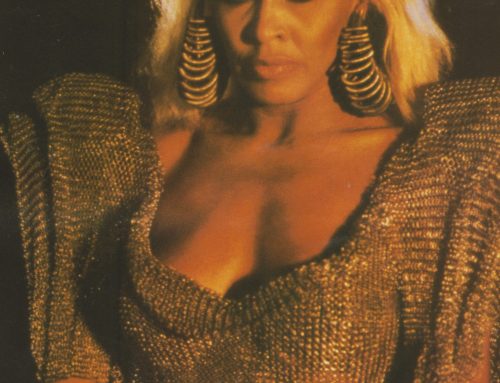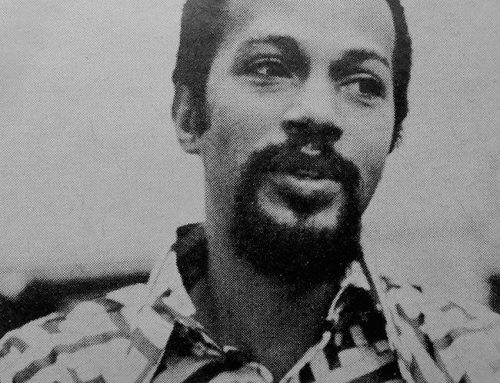January 2022: In honour of the groundbreaking musical pioneer James Mtume, who transitioned on January 9, 2022, we revisit SoulMusic.com founder David Nathan’s first interview with Mtume and Reggie Lucas in 1978, as the band MTUME’s first album, “Kiss This World Goodbye” was released….
Not Just Funnin’, Mtume Mean Real Business
By David Nathan
November 1978, in person interview with James Mtume & Reggie Lucas, Gulf + Western Building, New York City…
The band Mtume’s jumping off point came when two of the guys – James Mtume & Reggie Lucas – wrote a hit for Roberta Flack & Donny Hathaway, but they are more than just a songwriting team
IT SEEMS that we’re now entering into a whole new phase of development in regard creative forces these days. Somewhat of a sweeping statement you might think and what does it have to with the subject of our feature, Mtume, you may enquire. Well, it’s quite simple (well, maybe not that simple!): Mtume — composed of Mtume himself (“cosmic congas”, “concussion”, lead and background vocals, keyboards) Reggie Lucas (his songwriting partner and group’s guitarist), Hubert Eaves (keyboards), Basil Fearrington (bass), Howard King (drums) and Tawatha (vocalist) — are not your everyday group, not your average collection of muscians who got together to make it big. They have a definite plan, goals and strategy all mapped out to ensure that they will acheive the successful situation they’re seeking in the music world.
The launching pad for their plans comes via their debut Epic Album, “Kiss This World Goodbye”, the title in itself an indication of the thinking and consideration taken in selecting the musical format they’re presenting. The album has already given rise to one single, “Just Funnin’ “, taking the nation’s ears by storm and an example of the varied different styles to be found on the group’s initial set.
But for those who will want to know, some background. Philadelphia-born Mtume comes from a musical family with father Jimmy Heath, uncles Pency and Albert, jazz muscians of stature who obviously influenced the young man’s desire to enter the musical field. He cites Bob Dylan as a major influence alongside John Coltrane, Sun Ra, James Brown and Jimi Hendrix, all of whom he credits with making him aware that “music concerned itself with…re-expressing what was taking place on the level of social consciousness” and indeed, the time at which such influences affected Mtume was the turbulent mid-60s. Exposure to Hugh Masakela, a troupe of South African dancers, Letta Mbule and husband Caiphus Semenya gave Mtume the impetus to turn his growing musical urges to percussive instruments such as the congas. A move back to the East Coast brought gigs for the aspiring gent with Joe Henderson, McCoy Tyner and Freddie Hubbard and then ‘the big break’ when Miles Davis caught Mtume at the Village Vanguard in 1971.
With such notables as Leon Ndugu (producer of such acts as Flora Purim, Santana and others), Gary Bartz, Keith Jarett and Michael Henderson, Mtume became a fixture in the Miles Davis outfit until 1975. It was during this period, in 1972 in fact, that guitarist Reggie Lucas joined the unit, after the New York-born musician had played several professional gigs and worked on numerous sessions including Billy Paul’s “Me & Mrs. Jones” date. After joining the ubiquitous Mr. Davis, Reggie continued to contribute to the work of others such as Norman Connors, Flora Purim and Gary Bartz via sessions and his developing skills as a songwriter.
Indeed, Reggie and Mtume recall that their very first collaborative effort, song-wise, was back in 1974 “whilst we were on the road, in Japan, actually. It took us two months to put the lyrics together! It was a tune called ‘Seasons of the Heart’ and we tended to be over-involved in the more poetic aspects of the lyric. You could say it was a little too esoteric and of course, since then it’s been a process of refining in our writing.”
After the two gentlemen left the Miles Davis group, they concentrated efforts on honing their craft as songwriters as well as developing further skills as top notch musicians. “We had reached a point where a metamorphosis was necessary”. Accordingly, Mtume turned down offers of work with such folk as Weather Report and had begun to formulate with Reggie some of the initial ideas for the formation of their own group. In between times, they’d begun to submit material they’d written to various artists and people in the music industry. They recall: “We met total resistance almost all the way down the line. You spend time getting your craft together, preparing yourself and you get greeted with a blank refusal, rejection. In fact, there’s very little room for new writers although everyone says they’re looking for material. Because you’ve got to have a track record and how are you ever supposed to get that if no one gives you the chance?”
Material went to different artists that the two gents knew but nothing transpired and when Roberta Flack invited the duo to join her performing and recording band they accepted the offer in 1976. “Working with Roberta was a valuable experience because we were dealing with different audiences from the kind we were used to with Miles. With him, it was like being in school, he influenced us so much because he taught us about commitment to yourself — that’s a very important factor in your development as an artist. What was so interesting about Roberta’s situation is that there is a new energy infused into the unit we were working with with her. It’s like we’d have that basic middle-class kind of audience in Michigan, say, up and participating in our closing number which would be ‘Kiss This World Goodbye’ — a real trip!”
It was during a session for the “Blue Lights In The Basement” album for Ms. Flack that Mtume and Reggie got that first big hit song with “The Closer I Get To You”. They explain, “We’d presented her with the demo about eight months before the actual recording and nothing had happened with it. It was during a break at the session that we were just working on some of our stuff including ‘The Closer’ having the engineer just put it down on tape to hear what it would sound like. In fact, both the musicians and the engineer, Joe Ferla were the same guys that did the demo, Roberta’s version of the song and our own which is on the Epic album! Anyway, Roberta came back from her break and heard the song and asked if there were any lyrics. We let her hear them and she decided to do the song. It really was like an accident almost. Originally, Ronnie Foster did the male lead, then Zack Sanders and eventually, they sent the tape to Donny Hathaway in Chicago and he did his part there.”
But all the battles were not over, since everyone wasn’t quite as enthusiastic about the song and it was only after it was played at a convention for Atlantic Records’ personnel that the cut was even included on the “Blue Lights” album! “It seems that the company were unanimous after that that it would be a hit single. And, fortunately, they were absolutely right!” Prior to the release of the album and the single (which radio stations literally demanded as a single from the album), Mtume had already begun negotiations through producer Jerry Schoenbaum and his Zembu Productions, culminating in a deal with Epic Records and their debut album.
“Basically, we’d known all the musicians throughout the years and when vacancies had come up in Roberta’s band, we’d recommend people. We were fortunate in that we got the opportunity on the road with Roberta to work on our stuff, rehearse our material when we weren’t rehearsing hers.” Naturally, as a result, when the time came Mtume was ready! Commenting on the relationship between the musicians, they note: “We basically had reached that transition point almost simultaneously and having played together, we knew what we wanted to do, where we wanted to go.”
Since playing their last date with Roberta in April of this year, Mtume and co, have been busy bringing the plans and strategies involved in their own career into focus. “Musically, we see ourselves at that mid-point — somewhere between Parliament on the one hand and Earth, Wind & Fire on the other. We’ve always had a sense of theatrics — something we acquired from working with Miles Davis more than anything else — and we intend to combine impeccable musicianship with visual dynamics. We recognise the importance of giving people an onstage image, something for them to relate to. We want the impact and the fun to be conbined. After all, it’s so competitive out there that you have no choice, you must give that little extra.”
In formulating some term for their own brand of music, Mtume feels that “it’s not fusion per se. The way we see ourselves is the way we believe black music is heading in the 1980s. It will bring people whose roots are in jazz but they’ll be into funk — those people will be to the fore. We feel that the unit we have is going to touch upon all aspects of pop music.”
Certainly, Mtume’s debut album testifies to such a statement. From the cleverly-penned lyrically satirical “Just Funnin'” and “Metal Flake Mind” to the mellow and emotive “Closer To The End” and “This Is Your World”, Mtume run several gamuts. The closing “Kiss The World Goodbye” cut reveals the non-serious side of the group with its skit on The Floaters’ hit “Float On” — with such priceless lines as “my sign is spinach” etc! The group are putting much behind the success of their debut single and album to help catapult them into the position they see themselves in: “We’ve come to the realization that it’s all about gaining, maintaining and using power that you acquire through success. And that gives us a total confidence as artists. We’re fortunate in having the positive energy that Epic seems to be putting behind us working with us. We’re concerned about building a hit act and they understand that. That’s why we’ve said that we’d rather wait until we can get all the equipment, costuming and visual aspects together before we get out there and perform to any large extent. If that means putting the finance together for that ourselves, fine because it’s again about commitment to yourself. But it seems that if this album takes off, Epic have agreed to back up our program fully.”
Meanwhile, the principals in the group have many ideas about diversifying, using their creative talents in other areas: “We written some more material which will certainly appear on other people’s albums but we don’t want our concentration to be as songwriters alone. The area of producing is one that we definitely intend to expand in and one of our first projects will be a solo album from Reggie. In fact, we anticipate solo albums on several members of the group eventually, including Tawatha, our lead vocalist. Also, we’d like to do some other producing projects to develop more sources of income, including maybe an English rock group, because we figure the blending of what we’re about with what they’re about would bring a really interesting sound.”
Summing up, the group Mtume are resolute: “We’re not shooting at one particular audience, we want across the board appeal. We’re about building a structure and we know that all our progress is based on pitfalls, that’s what it’s all about. But we’ve got the motivation and we have the ability, so we’re ready for whatever comes our way”
DAVID NATHAN’S PERSONAL TRIBUTE TO JAMES MTUME






